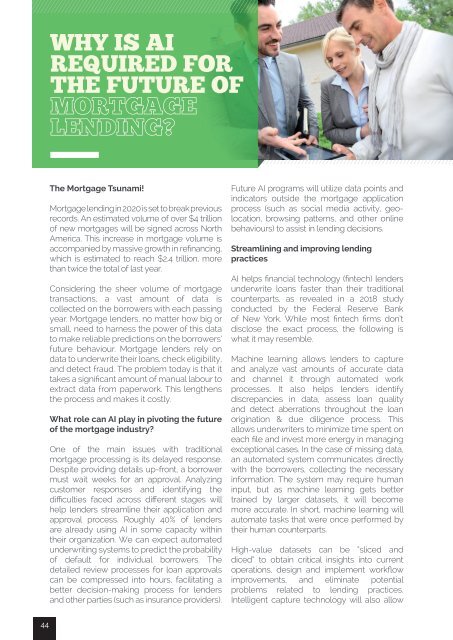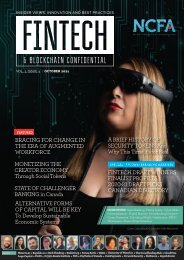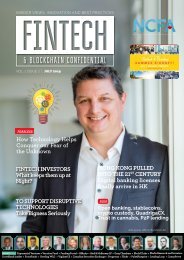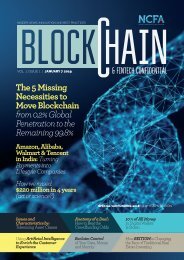NCFA Fintech Confidential December 2020 (Issue 3)
The National Crowdfunding & Fintech Association of Canada (NCFA) and partners are excited to present Vol. 1 Issue 3, FINTECH CONFIDENTIAL, a digital pop-up of the 6th annual 2020 Fintech & Financing Conference and Expo (FFCON20) held virtually across themed 8 weeks from July 9 to August 27 and co-hosted by NCFA and Toronto Finance International. The main theme of FFCON20 was “RISE”, reflecting the joint efforts of the two associations, NCFA and TFI, to build and increase the success and sustainability of Canada’s fintech and financial sector. There were many moving parts this year and a brand-new digital format with the event bringing together 100+ thought leaders, 50+ partners, and more than 500 attendees, 2 challenges and the inaugural Fintech Draft pitching and demo competitions. Congratulations to the winners: SolidBlock and MazumaGo (formerly DivDot)! Thanks to all the partners, speakers, attendees, volunteers and the entire organizing team for making FFCON20 an impactful and amazing online experience for Canada’s fintech and funding community. We hope you enjoy this issue of Fintech Confidential magazine – it certainly makes for great holiday reading! While everyone relentlessly strives to achieve success in 2021, we encourage you to bring in the new year with good health and to be mindful that we are all in this together, and to help others in your community more than ever before. Peace, happiness, and best wishes for an incredible year and journey ahead.
The National Crowdfunding & Fintech Association of Canada (NCFA) and partners are excited
to present Vol. 1 Issue 3, FINTECH CONFIDENTIAL, a digital pop-up of the 6th annual 2020 Fintech & Financing Conference and Expo (FFCON20) held virtually across themed 8 weeks from July 9 to August 27 and co-hosted by NCFA and Toronto Finance International.
The main theme of FFCON20 was “RISE”, reflecting the joint efforts of the two associations, NCFA and TFI, to build and increase the success and sustainability of Canada’s fintech and financial sector. There were many moving parts this year and a brand-new digital format with the event bringing together 100+ thought leaders, 50+ partners, and more than 500 attendees, 2 challenges and the inaugural Fintech Draft pitching and demo competitions. Congratulations to the winners: SolidBlock and MazumaGo (formerly DivDot)! Thanks to all the partners, speakers, attendees, volunteers and the entire organizing team for making FFCON20 an impactful and amazing online experience for Canada’s fintech and funding community.
We hope you enjoy this issue of Fintech Confidential magazine – it certainly makes for great holiday reading! While everyone relentlessly strives to achieve success in 2021, we encourage you to bring in the new year with good health and to be mindful that we are all in this together, and to help others in your community more than ever before. Peace, happiness, and best wishes for an incredible year and journey ahead.
Create successful ePaper yourself
Turn your PDF publications into a flip-book with our unique Google optimized e-Paper software.
WHY IS AI<br />
REQUIRED FOR<br />
THE FUTURE OF<br />
MORTGAGE<br />
LENDING?<br />
The Mortgage Tsunami!<br />
Mortgage lending in <strong>2020</strong> is set to break previous<br />
records. An estimated volume of over $4 trillion<br />
of new mortgages will be signed across North<br />
America. This increase in mortgage volume is<br />
accompanied by massive growth in refinancing,<br />
which is estimated to reach $2.4 trillion, more<br />
than twice the total of last year.<br />
Considering the sheer volume of mortgage<br />
transactions, a vast amount of data is<br />
collected on the borrowers with each passing<br />
year. Mortgage lenders, no matter how big or<br />
small, need to harness the power of this data<br />
to make reliable predictions on the borrowers’<br />
future behaviour. Mortgage lenders rely on<br />
data to underwrite their loans, check eligibility,<br />
and detect fraud. The problem today is that it<br />
takes a significant amount of manual labour to<br />
extract data from paperwork. This lengthens<br />
the process and makes it costly.<br />
What role can AI play in pivoting the future<br />
of the mortgage industry?<br />
One of the main issues with traditional<br />
mortgage processing is its delayed response.<br />
Despite providing details up-front, a borrower<br />
must wait weeks for an approval. Analyzing<br />
customer responses and identifying the<br />
difficulties faced across different stages will<br />
help lenders streamline their application and<br />
approval process. Roughly 40% of lenders<br />
are already using AI in some capacity within<br />
their organization. We can expect automated<br />
underwriting systems to predict the probability<br />
of default for individual borrowers. The<br />
detailed review processes for loan approvals<br />
can be compressed into hours, facilitating a<br />
better decision-making process for lenders<br />
and other parties (such as insurance providers).<br />
Future AI programs will utilize data points and<br />
indicators outside the mortgage application<br />
process (such as social media activity, geolocation,<br />
browsing patterns, and other online<br />
behaviours) to assist in lending decisions.<br />
Streamlining and improving lending<br />
practices<br />
AI helps financial technology (fintech) lenders<br />
underwrite loans faster than their traditional<br />
counterparts, as revealed in a 2018 study<br />
conducted by the Federal Reserve Bank<br />
of New York. While most fintech firms don’t<br />
disclose the exact process, the following is<br />
what it may resemble.<br />
Machine learning allows lenders to capture<br />
and analyze vast amounts of accurate data<br />
and channel it through automated work<br />
processes. It also helps lenders identify<br />
discrepancies in data, assess loan quality<br />
and detect aberrations throughout the loan<br />
origination & due diligence process. This<br />
allows underwriters to minimize time spent on<br />
each file and invest more energy in managing<br />
exceptional cases. In the case of missing data,<br />
an automated system communicates directly<br />
with the borrowers, collecting the necessary<br />
information. The system may require human<br />
input, but as machine learning gets better<br />
trained by larger datasets, it will become<br />
more accurate. In short, machine learning will<br />
automate tasks that were once performed by<br />
their human counterparts.<br />
High-value datasets can be “sliced and<br />
diced” to obtain critical insights into current<br />
operations, design and implement workflow<br />
improvements, and eliminate potential<br />
problems related to lending practices.<br />
Intelligent capture technology will also allow<br />
44






